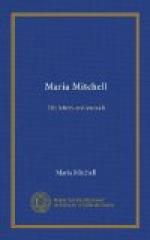“Professor Sedgwick came early—an old man of seventy-four, already a little shattered and subject to giddiness. He is said to be very fond of young ladies even now, and when younger made some heartaches; for he could not give up his fellowship and leave Cambridge for a wife; which, to me, is very unmanly. He is considered the greatest geologist in England, and of course they would say ‘in the world,’ and is much loved by all who know him. He came to Cambridge a young man, and the elms which he saw planted are now sturdy trees. It is pleasant to hear him talk of Cambridge and its growth; he points to the stately trees and says, ‘Those trees don’t look as old as I, and they are not.’
“I did not see Professor Adams at that time, but I spent the whole of Monday morning walking about the college with him. I asked him to show me the place where he made his computations for Neptune, and he was evidently well pleased to do so.
“We laughed over a roll, which we saw in the College library, containing a list of the ancestors of Henry VIII.; among them was Jupiter.
“Professor Adams tells me that in Wales genealogical charts go so far back that about half-way between the beginning and the present day you find this record: ‘About this time the world was created’!
“November 2. At lunch to-day Dr. Whewell was more interesting than I had seen him before. He asked me about Laura Bridgman, and said that he knew a similar case. He contended, in opposition to Mrs. Airy and myself, that loss of vision was preferable to loss of hearing, because it shut one out less from human companionship.
“Dr. Whewell’s self-respect and immense self-esteem led him to imperiousness of manner which touches the border of discourtesy. He loves a good joke, but his jests are serious. He writes verses that are touchingly beautiful, but it is difficult to believe, in his presence, that he writes them. Mrs. Airy said that Dr. Whewell and I riled each other!
“I was at an evening party, and the Airy boys, young men of eighteen and twenty, were present. They stood the whole time, occasionally leaning against a table or the piano, in their blue silk gowns. I urged them to sit. ‘Of course not,’ they said; ’no undergraduate sits in the master’s presence!’
“I went to three services on ‘Scarlet Sunday,’ for the sake of seeing all the sights.
“The costumes of Cambridge and Oxford are very amusing, and show, more than anything I have seen, the old-fogyism of English ways. Dr. Whewell wore, on this occasion, a long gown reaching nearly to his feet, of rich scarlet, and adorned with flowing ribands. The ribands did not match the robe, but were more of a crimson.
“I wondered that a strong-minded man like Dr. Whewell could tolerate such trappings for a moment; but it is said that he is rather proud of them, and loves all the etiquette of the olden time, as also, it is said, does the queen.




